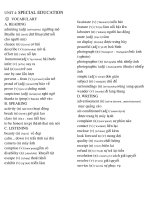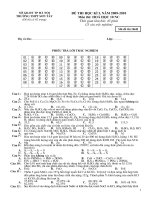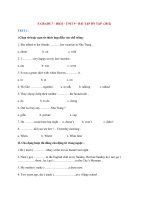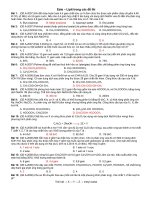Unit 4 +7 bài tập cực hay
Bạn đang xem bản rút gọn của tài liệu. Xem và tải ngay bản đầy đủ của tài liệu tại đây (114.19 KB, 14 trang )
UNIT 4: SPECIAL EDUCATION
☺ VOCABULARY
A. READING
admiring (adj) [əd'maiəriη] ngưỡng mộ
Braille (n) [breil] chữ Bray(chữ nổi
cho người mù)
chance (n) [t∫ɑ:ns] cơ hội
describe (v) [dis'kraibə] mô tả
effort (n) ['efət] nổ lực
humorous(adj) ['hju:mərəs] hài hước
infer (v) [in'fə:] suy ra
kid (n) [kid] trẻ con
one by one lần lượt
prevent … from (v) [pri'vent] cản trở
proud of (adj) [praud] tự hào về
prove (v) [pru:v] chứng minh
suspicious (adj) [sə'spi∫əs] nghi ngờ
thanks to (prep) ['θỉηks] nhờ vào
B. SPEAKING
activity (n) [ỉk'tiviti] hoạt động
break (n) [breik] giờ giải lao
class (n) [klɑ:s ; klỉs] tiết học
to be honest (exp) thành that mà nói
C. LISTENING
beauty (n) ['bju:ti] vẻ đẹp
calm … down (v) trấn tónh (ai đó)
camera (n) máy ảnh
comprise (v) [kəm'praiz]gồm có
disability (n) [,disə'biliti] khuyết tật
escape (v) [is'keip] thoát khỏi
exhibit (v) [ig'zibit] triển lãm
fascinate (v) ['fỉsineit] cuốn hút
feature (v) ['fi:t∫ə] làm nổi bật lên
labourer (n) ['leibərə] người lao động
mute (adj) [mju:t] câm
on display [dis'plei] được trưng bày
peaceful (adj) ['pi:sfl] hoà bình
photograph (n) ['foutəgrɑ:f ; 'foutəgrỉf] bức ảnh
(=photo)
photographer (n) [fə'tɔgrəfə] nhà nhiếp ảnh
photographic (adj) [,foutə'grỉfik] (thuộc) nhiếp
ảnh
simple (adj) ['simpl] đơn giản
subject (n) ['sʌbdʒikt] chủ đề
surroundings (n) [sə'raundiηz]vùng xung quanh
wander (v) ['wɔndə] đi lang thang
D. WRITING
advertisement (n) [əd'və:tismənt, ,ỉdvə'taizmənt]
mục quảng cáo
air-conditioned (adj) ['eəkən'di∫nd]
được trang bò máy lạnh
complaint (n) [kəm'pleint] sự phàn nàn
contact (v) ['kɔntỉkt] liên lạc
enclose (v) [in'klouz] gởi kèm
look forward to (v) mong đợi
quality (n) ['kwɔliti] chất lượng
receipt (n) [ri'si:t] biên lai
refund (n) [ri:'fʌnd] sự trả lại tiền
resolution (n) [,rezə'lu:∫n] cách giải quyết
resolve (v) [ri'zɔlv] giải quyết
service (n) ['sə:vis] sự phục vụ
E. LANGUAGE FOCUS
ambulance (n) ['ỉmbjuləns] xe cứu thương
delay (v) [di'lei] hoãn lại
give up (v) từ bỏ
injured (adj) ['indʒəd] bò thương
offer (v) ['ɔfə] tỏ ý muốn
put … up (v) cho (ai) trọ
rarely (adv) ['reəli] hiếm khi
rob (v) [rɔb] cướp
scene (n) [si:n] hiện trường
unemployed (adj) [,ʌnim'plɔid] thất nghiệp
☺ GRAMMAR
1. The + adjective
Dùng để chỉ một nhóm người.
the injured (người bò thương), the poor
(người nghèo), the rich (người
giàu), the sick (người bệnh), the
unemployed (người thất nghiệp), the young
(người trẻ tuổi), the disabled (người khuyết
tật), the blind (người khiếm thò), the dead
(người chết), …
Ex: The rich should help the poor.)
2. Used to + infinitive (đã từng/thường)
Diễn tả thói quen trong quá khứ, đã chấm
dứt ở hiện tại.
Ex: His father used to smoke 20 cigarettes a
day. Now he gives up
smoking.
(Cha của anh ấy từng hút 20 điếu thuốc một
ngày. Bây giờ bác ấy đã
bỏ thuốc rồi.)
3. Which as a connector
Dùng để thay thế một mệnh đề được nói
trước đó.
Ex: Sheila couldn’t come to the party, which
was a pity.
(Sheila không thể đến dự tiệc, đó là điều
đáng tiếc
Week : UNIT 4 : SPECIAL EDUCATION
Period:
Aims:
Help Ss review their knowledge thoroughly doing exercise
They have a chance to practice
A/ TU LUAN
I/ GIVE THE CORRECT FORM OF THE GIVEN VERBS
1. I (have) __________ coffee for breakfast every day.
2. They (begin) __________ to study at this school 7 years ago.
3. It (rain) __________ very much in the summer.
4. Bad students never (work) __________ hard.
II/ REWRITE THE SENTENCES
1. Dennis gave up smoking two years ago. (using used to)
------------------------------------------------------------------------------------------------------------------------
2. When Barbara was in Italy, she stayed with an Italian family. (using used to)
------------------------------------------------------------------------------------------------------------------------
3. People who have lots of money have comfortable lives.(using the + adj)
-----------------------------------------------------------------------------------------------------------------------
4. We live near a special school for people who can’t hear. (using the + adj)
------------------------------------------------------------------------------------------------------------------------
5.They didn’t finish their work. That makes my teacher angry. (using which connector)
-----------------------------------------------------------------------------------------------------------------------
6.He ate too much. That made all of us very worried. (using which connector)
----------------------------------------------------------------------------------------------------------------------
B/ MULTIVE CHOICE
I/ Choose the word that has the underlined part different from others
1. a. disabled b. forced c. believed d. realized
2. a. rubbish b. suburb c. lunch d. consume
II/ Choose the word that has pronounced differently from others
3. a. prevent b. describe c. infer d. effort
4. a. subject b. escape c. simple d. service
III/ Vocabulary and grammar
5. The heavy rain prevented us___________ going out for a picnic
a. on b. in c. from d. for
6. My teacher is proud ____________ my class
a. on b. of c. from d. about
7. I went to school in ________________ morning
a. the b. a c. an d. nothing
8. The President expressed his deep sorrow over the bombing deaths.
a. regret b. anger c. sadness d. passion
9. In spite of her deafness, she played the violin very well.
a. inability speak b. inability to see c. inability to hear d. mentally impairment
10. I have been fascinated by _____ since I was at secondary school.
a. photograph b. photographic c. photographer d. photography
11.The aim of the LIVE project is to train students from developing _____.
a. nations b. nationals c. nationalities d. nationalism
12. Tony: _________________________________ ?
Ann : In a house near Brighton.
a. What's your address? b. Where are you? c. Where you live? d. Where do you live?
13. subject/ you/ what/ best/ like
a. What best subject you like? b. What subject you like best?
c. What subject do you like best? d. What subject do you best like
14. When I was a child, summers was used to be warmer and winters colder than now.
a b c d
15. What do you use to do when you felt afraid ?
a b c d
IV/ Read the passage and make the correct choice:
Louis Braille was born in 1809 in Coupvray. He was a French (16) _______ of the blind. He himself
was blind from the age of three, and in 1818 he went to the National Institute (17) ________ the Young
Blind in Paris. Soon showing marked (18) _______ in both science and music, he became famous in Paris as
an organist and violoncellist. In 1826 Braille began teaching the blind in the (19) ________. Braille is known
for his idea of modifying the Barbier “point writing” system, used for coded army messages, to enable the
blind to read. Point writing (20) ________ of embossed dots and dashes on cardboard; the Braille system
derived from it is used successfully today, in slightly modified form, and in many countries.
16. a. designer b. doctor c. teacher d. lawyer
17. a. for b. of c. to d. with
18. a. activity b. ability c. intelligence d. determination
19. a. academy b. organization c. school d. institute
20. a. contains b. combines c. consists d. comprises
KEYS :
A/ TU LUAN:
I/ 1.have 2.began 3. rains 4. work
II/ 1. Dennis used to smoke a lot
2.When Barbara was in Italy she used to stay with Italian family
3. The rich have comfortable lives
4. . We live near a special school for the deaf
5.They didn’t finish their work which makes my teacher angry.
6.He ate too much which made all of us very worried
B/ TRAC NGHIEM
I +II+III+IV
1b 2d 3d 4b 5c 6b 7a 8c 9c 10d 11a 12d 13c 14b
15a 16c 17a 18b 19d 20c
Week : UNIT 4 : SPECIAL EDUCATION
Period :
Aims
Consolidation the grammar and vocabulary in unit 4
A/ TU LUAN
I/ GIVE THE CORRECT FORM OF THE GIVEN VERBS
1. He (visit) ______ his friend yesterday and (find) ______ that he had been out.
2. She sometimes (buy) ___________ vegetables at his market.
3. I have not seen John for a long time. I (see) __________ him 3 weeks ago.
4. It (be)__________ very cold now.
II/ REWRITE THE SENTENCES
5. I prefer listening to classical music now, although when I was young I couldn’t stand it.(using used to)
-…………………………………………………………………………………………………………
6. My sister looked so fat when she returned from Paris. .(using used to)
-…………………………………………………………………………………………………………
7. What can we do to feed people who do not have enough to eat ?(using the +adj)
-………………………………………………………………………………………………………
8. Braille is a reading system for people who are unable to see.(using the + adj)
-………………………………………………………………………………………………………
9. It rained all night. This was good for the garden ( using which connector)
-………………………………………………………………………………………………………
10. You left the key in the car. That was rather careless of you.( using which connector)
-………………………………………………………………………………………………………
B/ MULTIVE CHOICE
I/ Choose the word that has the underlined part different from others
1. a. deaf b. teach c. reading d. seat
2. a. pity b. children c. blind d. finger
II/ Choose the word that has pronounced differently from others
3. a. surroundings b. complaint c. contact d. enclose
4. a. comprise b. conditioned c. complaint d. service
III/ Vocabulary and grammar
5. He lives in a flat ______ the fifth floor.
a. on b. in c. at d. above
6. We didn’t go ______ the party because some friends came to stay with us.
a. to b. for c. at d. in
7.We put those books on __________________ shelf
a. the b. a c. an d. zero
8. Some of the more time-consuming jobs can now be done by machines.
a. taking much time b. taking little time c. odd d. not affected by time
9. Robert is completely ____________ in his new book on photography
a. absorbed b. interested c. disappointed d. occupied
10. He invented a new kind of wheelchair for the _____.
a. unemployed b. poor c. disabled d. unhappy









